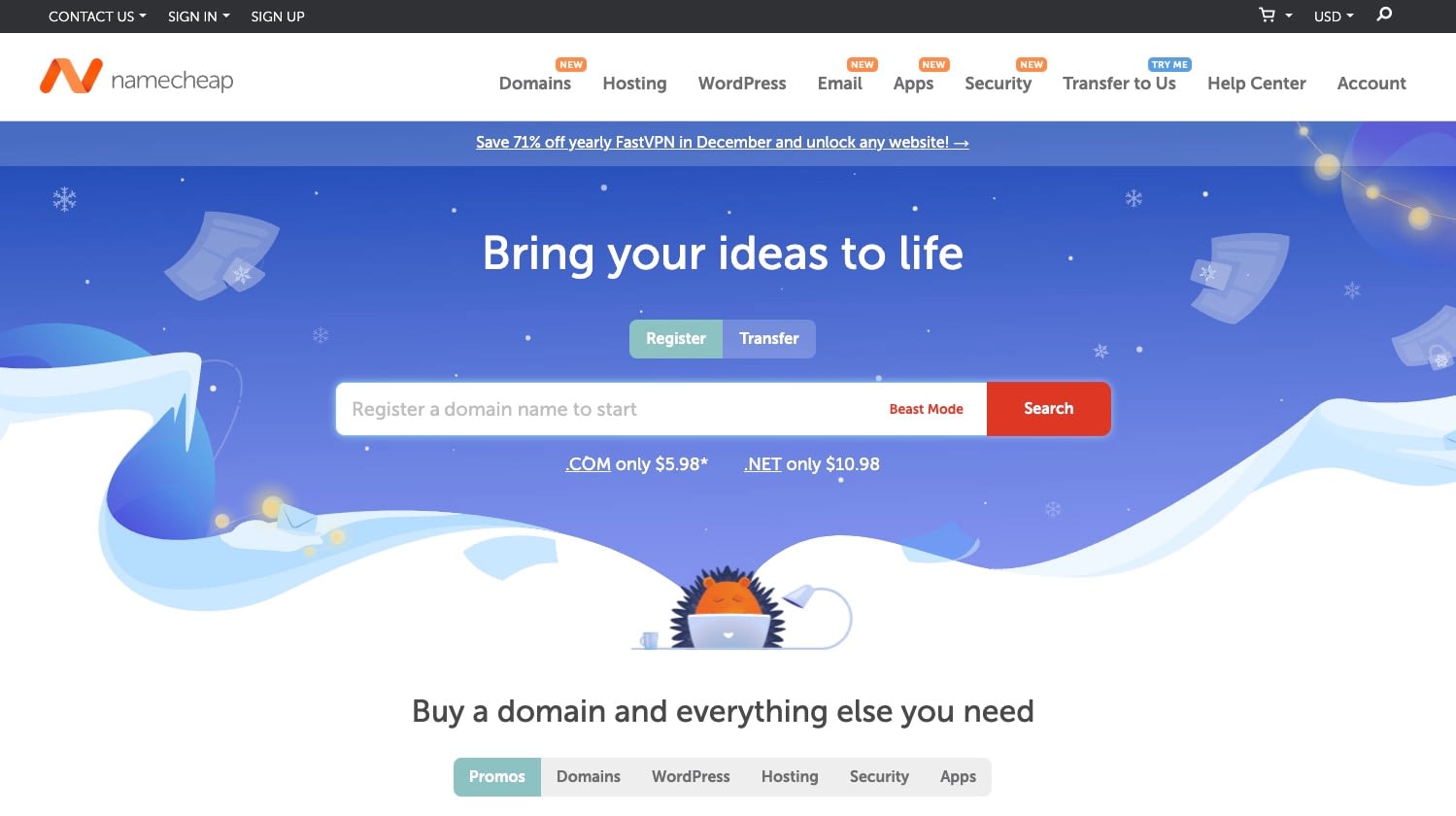Planning on launching a website but can’t decide between a .org vs .com domain name? You are not alone. Many people share the same problem.
If you are interested in building your own website, you will most likely have to handle two things first of all: choosing the right name for your website and setting up a corresponding domain.
The latter seems to confuse people the most. Granted, the differences between a .org vs .com are not as significant as you may think, but you should still get a basic understanding of what sets them apart.
Therefore, this article will explain what a domain extension is and then walk you through the .org vs .com domain extensions. Next, we will explain how they differ and how to choose between them. Finally, we will see where you can get your preferred domain.
 Table of contents:
Table of contents:
What are domain extensions?
Simply put, a domain extension is the combination of characters following the final period in a web address. For example, in an address like netflix.com, .com is a domain extension. A domain extension is also known as Top Level Domain (TLD).
There’s a lot of technical nuance to how domains work under the hood or why they were even invented in the first place. We don’t need to go too deeply into all that, but the short story is that domain names take complex web addresses used by computers and translate them into human-understandable brand names.
As a result, domain names serve to simplify how we can all access the web and interact with all the websites out there.
Domain extensions help to facilitate that while also introducing another layer of categorization among domain names.
For example, domain extensions can give people more information about your site. A Top Level Domain like .edu tells potential visitors that they are viewing an education-related website – likely of a university or school. A .dog domain extension (yes, there are those as well) means that the site is probably devoted to someone’s furry friend.
Other times, domain extensions could include geographical information. Top Level Domains such as .co.uk tell people that the site is meant to serve audiences from the UK.
All that being said, however, the most popular domain extensions you can register are .com and .org – hence the topic of this post.
Plus .net is quite popular as well…
How to decide between .org and .com
One of the most important factors you should try to consider when picking a domain is how well it will serve your objectives.
The truth is that both .org and .com TLDs are good for most websites. But there are differences that might make you think twice before picking either one.
Remember, your domain has the potential of defining your site and giving potential visitors more information about you.
Most importantly, it can, in one way or another, dictate how successful your venture will be. It is, therefore, important to choose a domain extension that meets your objectives.
How to decide between org vs com can be affected by different factors such as:
Availability
Not all Top Level Domains are easily available. If you’ve ever attempted to buy a domain name that’s based on a common word, you know how hard this can be. All the best names are already owned by someone, so there’s zero chance you’re going to get your hands on something like pizza.com or carrepair.com.


Very often, you will have to spend a lot of time before you come up with an original word, brand name, or phrase that’s available as a .com.
Sometimes, you might go to check whether your domain is available only to realize that someone beat you to the punch and bought it ten years ago.
There are two things you can do about this:
- Get a .org domain instead
- Look for an entirely different domain name
The first option may seem like a good solution at first, but it’s actually not advisable to buy a .org version of a domain if the .com of it is owned by someone else.
Let’s emphasize on this once more: don’t buy a .org domain if you don’t already own a .com as well.
For example, let’s say your name is John and you have a pizza restaurant. If a domain name like johnspizza.com is already owned by someone else, then you should absolutely not get johnspizza.org instead.
There are a couple of problems if you do this:
- You’re creating confusion in the marketplace. People will never memorize if they should go to the .com or .org to find your specific pizzeria.
- You’re also potentially getting yourself into legal trouble. More or less, you’re infringing on someone else’s trademark – the other John’s – by registering a name that’s too similar to theirs – although we’re not lawyers and you shouldn’t treat this text as legal advice.
Your best plan in this situation is to go for the second option and get another domain name. Altering your domain plans and getting something different is a better decision even though it might take a few additional tries.
Cost
In an ideal scenario, a new domain name from most providers will not cost you much in a year. However, not all Top Level Domains cost the same.
Depending on the registrar you buy the domain from and the TLD you choose, there can be some mild differences in how much you’ll have to pay in a year.
For example, Namecheap will sell you a new .com domain for $8.88 for the first year. If you buy the same domain from Domain.com, it’s going to be $9.99.
When it comes to .org, Namecheap offers them at $11.98, while Bluehost will sell you one for $8.99.
In general, though, .com domains are a bit cheaper than .org. The difficulty with them is that there’s simply less of them available.
Important note: we’re only discussing what it cost to register new domains here. If you want to buy a pre-owned domain name, the cost of that can be multiple times more than that of a new domain.
Marketability
Your choice of domain extension can have little bearing on your web traffic and the overall success of your business.
However, this is not a black-and-white situation.
For example, due to historical factors, .org extensions come with certain contexts. They are usually used by non-profits, charities, research facilities, or foundations.
On the other hand, “.com” stands for “commercial,” which means that by definition, .com domains are intended for business and professional use.
Therefore, if you plan to start an ecommerce store, for example, it would serve you well to use a .com TLD instead of a .org. Consequently, if you plan on starting a charity or anything adjacent, a .org TLD will serve you better.
Note that if your initial plan was to set up a .org domain, consider getting a .com extension as well and redirect the traffic to your .org website. Remember, .com is the most recognizable extension and some people will mistakenly type your web address with a .com extension anyway. You also don’t want someone else buying a .com extension similar to your .org domain and potentially ruining your plans.
Where to get org vs com domains
Now that you understand the difference between org vs com, it’s time to buy the domain of your choice.
But where do you actually get these domains?
Domains are sold by domain registrars. These are businesses that reserve domain names and let you redirect them to point at your web server or email inbox. There are many – tens if not hundreds – domain registrars on the internet.
We are going to narrow things down for you a bit and show you just two excellent options for registering both .com and .org domains:
Namecheap


Namecheap is one of the biggest domain registrars in the world. It has tons of TLDs available, including .com and .org, of course.
Compared to most domain registrars on the market, Namecheap has some of the best prices. It is a great option for you if you are looking to save costs by buying a cheap domain. The features and pricing models are aligned with Namecheap’s principle of allowing everyone to get affordable domains.
Namecheap is also a great domain registrar for you if you are looking to:
- Test out a business idea. You won’t have to spend too much on a domain to validate your project.
- Enjoy free migration services for your website from another provider.
Namecheap also offers additional features for anyone looking to get a domain with them. Some of these include:
- Free domain privacy protection to keep areas such as your inbox spam-free
- A free email trial to get you started on your branding
- Free DNSSEC security to prevent traffic redirection from your site
Overall, Namecheap is a great option for anyone looking for just cheap domains and has hosting plans elsewhere.
Bluehost


Bluehost is perhaps one of the most recognizable web hosting companies on the market. Chances are, you’ve heard of Bluehost thanks to its popularity and aggressive marketing strategies.
But wait, what is it doing here considering we were supposed to discuss getting .com and .org domains?
Yes, unlike Namecheap, which might be considered a domain-first business, Bluehost is a web hosting company. This makes it a great option for anyone who’s buying a domain name to then immediately use it for a new website – which is most people. After all, you probably aren’t just buying a domain for the sake of it.
Bluehost can be great for you if:
- You don’t have the technical knowledge to set up hosting for your new site. The setup process is easy and straightforward with Bluehost.
- You are looking for unlimited hosting resources such as bandwidth, storage, and websites.
Now the best part: since Bluehost’s main target is to host your site, they will give you a .com domain name for free for the first year if you buy hosting from them. They will also set things up in a way that the domain will be pointing to your website right from the get-go.
Plus, they also offer some other cool features:
- Free premium themes to help customize your site
- Automatic WordPress installation
- Search engine optimization features to help drive traffic to your site
- Google My Business integration to boost your online credibility
Overall, Bluehost is best suited for anyone looking to set up a WordPress site on their new domain name. If you are familiar with WordPress and would like to take advantage of its capabilities, Bluehost is your best way in. It combines an easy-to-use interface, great support, and great performance to also make it an ideal option for most beginners.
Conclusion
When it comes to picking your domain extension between .org vs .com, the trick is to strike a balance between cost, availability, and marketability. Once that’s in order, the only thing you will have to worry about is whether your domain registrar’s offers align with your needs.
At the end of the day, the best path forward is to:
- Get a .org if your site is meant to serve any non-profit purpose – such as a charity, NGO, or anything to that tune.
- Get a .com for any other purpose.
And as to where to best buy them, we recommend Bluehost and Namecheap.
Do you have any questions regarding picking your domain extension? Let us know in the comments section below!
The post .ORG vs .COM Domains: Which One to Get and How They Differ appeared first on Revive Social.
Revive Social
